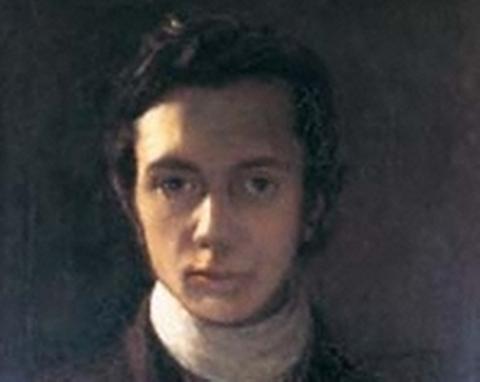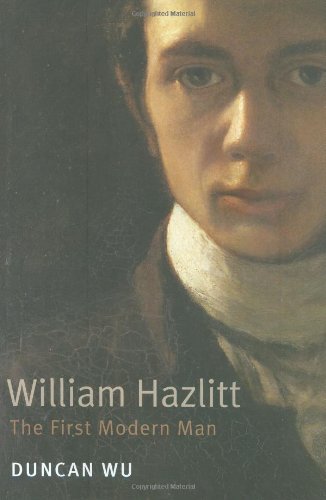The romantic radical

In January 1814 a little known journalist was sent to review Edmund Kean’s first performance as Shylock in The Merchant of Venice at London’s Drury-Lane Theatre. Overnight the review catapulted the critic, William Hazlitt, to the status of a national celebrity. Hazlitt then embarked upon one of the most illustrious and controversial of literary careers. Duncan Wu has now chronicled the turbulent life of this brilliant man of letters in William Hazlitt: The First Modern Man.
William Hazlitt was born in Maidstone, Kent in 1778. His father belonged to an Irish Protestant family which had emigrated from Tipperary. A Unitarian minister, Hazlitt senior took his family back to Ireland in 1780, settling in Bandon, Co. Cork. Taking up the cause of maltreated American revolutionary prisoners, he then brought his family to Boston, and founded the first Unitarian Chapel there before returning to England in 1787.
Hazlitt’s father had hopes that his son’s strong literary interests could be put in the service of religion and sent him to a Unitarian seminary in Hackney when he was 15. This scheme backfired when William came under the influence of the dissenting thinkers who lectured there. Hazlitt’s break with religion was hastened when he met the poets Samuel Taylor Coleridge and William Wordsworth. Their encouragement was enough to convince him to find his own way in life.
Hazlitt then began many years of struggle. His original ambition was to become a painter, and he departed for France in 1808. In Paris, Hazlitt divided his days between copying old masters in the Louvre, working on his own pictures, and enjoying a bohemian lifestyle. However, he was often miserably poor and once spent a fortnight living solely on coffee. Eventually Hazlitt found his interests drifting back to literature. He returned to England, married Sarah Stoddart, a friend of the sister of his greatest ally, the essayist Charles Lamb, had a son, and decided to undertake a series of public lectures on philosophy.
After a disastrous start these lectures proved popular and led to a gradual appreciation of Hazlitt’s intellectual prowess. A magazine editor offered him a job as a parliamentary reporter. A meeting with a benevolent publisher even saw the appearance of Hazlitt’s own philosophical tract, An Essay on the Principles of Human Action. But it was Hazlitt’s filling in as theatre critic on the auspicious occasion of Edmund Kean’s first night as Shylock that finally made his employers take note of his colossal knowledge. He was quickly given free-reign to write essays on his favourite subjects, including drama, art, literature and human behaviour.
Hazlitt rose to prominence during a great period of great political upheaval. The Napoleonic Wars had raged throughout his adolescence but the Corsican conqueror’s defeat ended Hazlitt’s hopes for a Europe liberated from the ignorant despots who proclaimed the divine right of kings. His innate hatred of tyranny and assumed privilege deepened and he began a personal crusade in the pages of several newspapers. Hazlitt prided himself on being a plain speaker and his scathing polemics derided the individuals and institutions he saw as standing in the way of freedom and equality.
Regency England was a dangerous place to be an individual. Hazlitt strode through a world of servile politicians, reactionary journalists and self-obsessed poets all fawning for honours, while the mighty alliance of Church and State forbade freedom of speech. Hazlitt’s tirades challenged the corrupt status quo, winning him admirers and many, many enemies. Not all of Hazlitt’s writings were on such serious matters. Some of his most lasting essays are those dealing with ordinary life, such as Why Distant Objects Please, On the Pleasure of Hating, On the Love of Life, On Going a Journey and his immortal account of a bare-knuckle boxing match The Fight. All of these are composed in Hazlitt’s masterly prose-style, a mercurial combination of fond, slightly morose remembrance, hilarious, acerbic humour and a palpable sense of wonder at the world around him.
Hazlitt’s separated from his wife in 1820 and moved into rented lodgings. Here he met Sarah Walker, his landlord’s daughter. She was the living embodiment of his Romantic feminine ideal and he fell helplessly in love with her. Her teasing drove him mad and Hazlitt wrecked his life trying to possess her. Knowing that his enemies were closing in, he published his own account of their affair, which left him publicly humiliated. In time Hazlitt remarried, set out on the Grand Tour and was rejuvenated by his journeys to the great cities of Europe. When he returned home he began to write again and his project this time was a biography of Napoleon. He completed this mammoth task in the last months of his life before dying in 1830.
In this biography Duncan Wu makes a persuasive case for considering William Hazlitt the figure who developed the modern liberal agenda. By inventing the opinion piece and creating the role of the pundit he played a vital part in shaping the evolution of the mass media. Without him it really is hard to imagine that a Charles Dickens, George Orwell or Noam Chomsky could have existed. When it came to the subject of his legacy Hazlitt himself remained characteristically modest. As he once wrote, “I have loitered my life away, reading books, looking at pictures, going to plays, hearing, thinking, writing on what pleased me best. I have wanted only one thing to make me happy, but in wanting that wanted everything.”
 William Hazlitt: The First Modern Man by Duncan Wu
William Hazlitt: The First Modern Man by Duncan Wu
Oxford University Press 400 pages
EURO: 30
